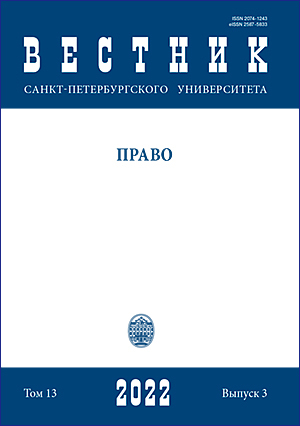Уголовно-правовое регулирование противодействия киберпреступности в Китае: состояние, тенденции и недостатки
DOI:
https://doi.org/10.21638/spbu14.2022.305Аннотация
В современном Китае киберпреступность становится все более распространенной, что породило теоретическую необходимость переосмысления уголовного права на базовом теоретическом уровне. Китайские правоведы и практики характеризуют киберпреступность с четырех точек зрения: с точки зрения предмета преступления, инструмента преступления, места преступления и взаимных связей. Поддерживая данную позицию с учетом соответствующих положений уголовного законодательства Китая о киберпреступности, автор статьи считает, что под киберпрестпностью понимается любое преступление, совершаемое с помощью компьютерной системы или сети, в ее рамках либо против нее. При регулировании противодействия преступлениям в киберпространстве следует сместить акцент киберуголовного права с традиционного сетецентрического на ориентированное на данные и построить систему защиты правовых благ в виде ориентации на данные. Кроме того, расширение объективных составных элементов киберпреступлений должно быть умеренным. Определенные киберправонарушения нельзя квалифицировать как незаконное предпринимательство (ст. 225 Уголовного кодекса КНР), так как это противоречит принципу законности уголовного права. Содержание заведомости в качестве признака субъективной стороны преступления должно быть переосмыслено и расширено на вероятное представление о совершении преступлений без сговора с исполнителем в соучастии в преступлении. Теоретическая основа для идентификации соучастия в киберпреступлении должна быть скорректирована путем утверждения односторонней субъективной связи. Посредством систематической корректировки и переосмысления основной теории уголовного права в этой области осуществляется постепенное совершенствование уголовно-правовых норм по регулированию борьбы с киберпреступностью в эпоху информационных сетей.
Ключевые слова:
киберуголовное право, киберпреступность, киберпространство, заведомость, незаконное приобретение данных, соучастие в киберпреступлении, соучастие с одной субъективной связью, регулирование киберпреступлений
Скачивания
Библиографические ссылки
Загрузки
Опубликован
Как цитировать
Выпуск
Раздел
Лицензия
Статьи журнала «Вестник Санкт-Петербургского университета. Право» находятся в открытом доступе и распространяются в соответствии с условиями Лицензионного Договора с Санкт-Петербургским государственным университетом, который бесплатно предоставляет авторам неограниченное распространение и самостоятельное архивирование.






